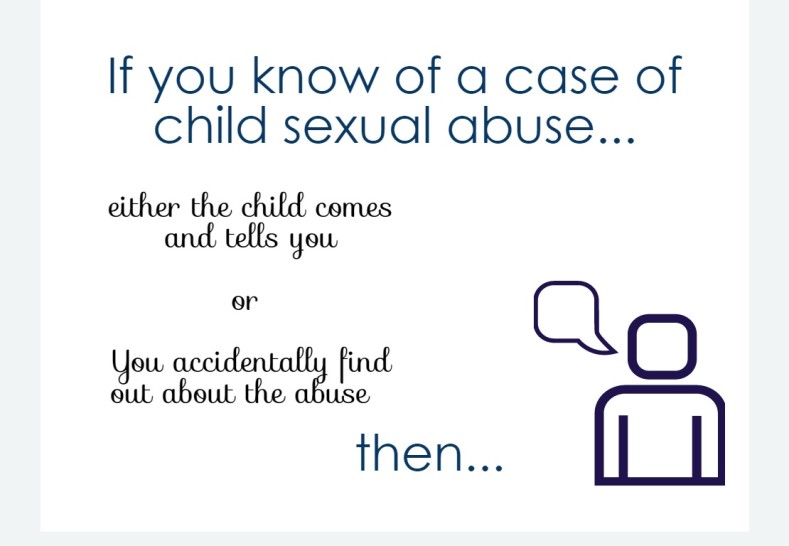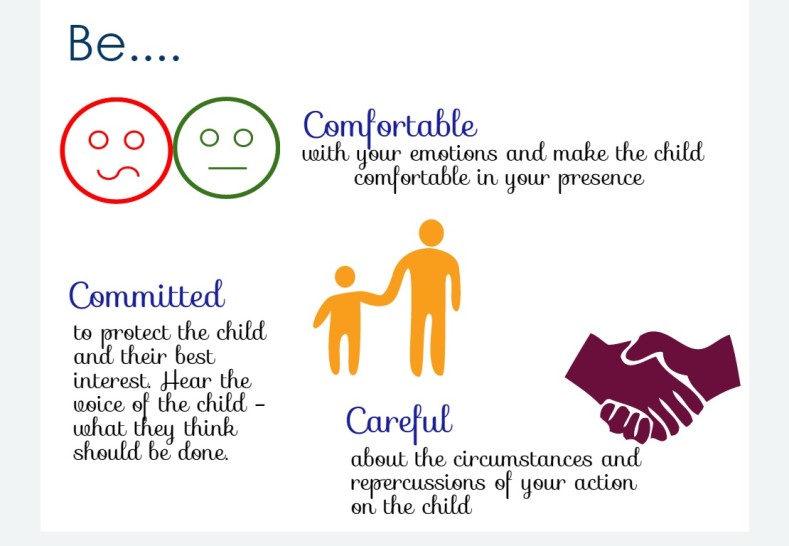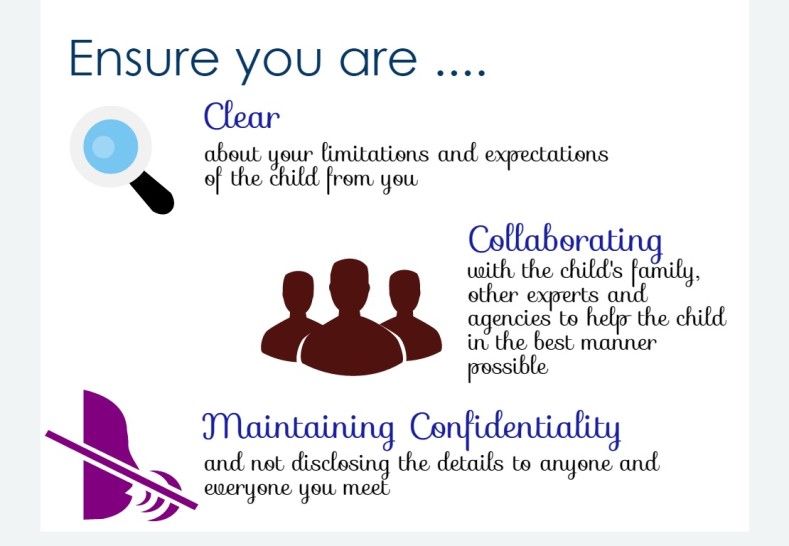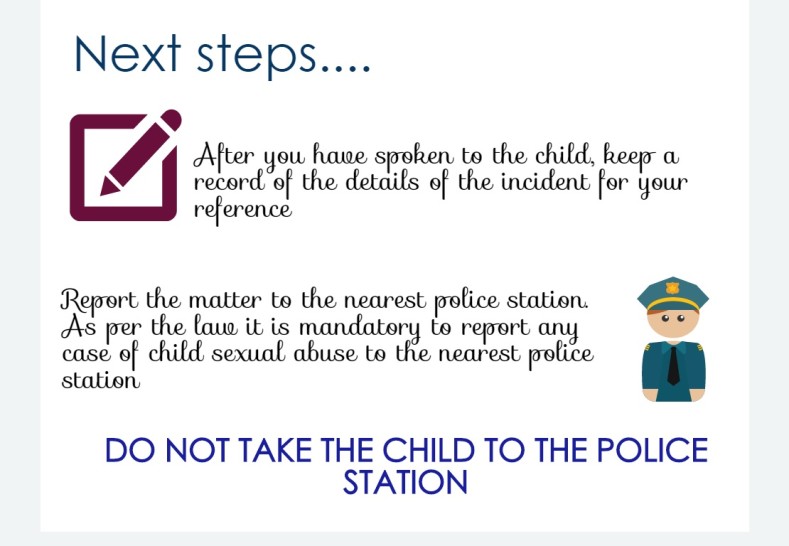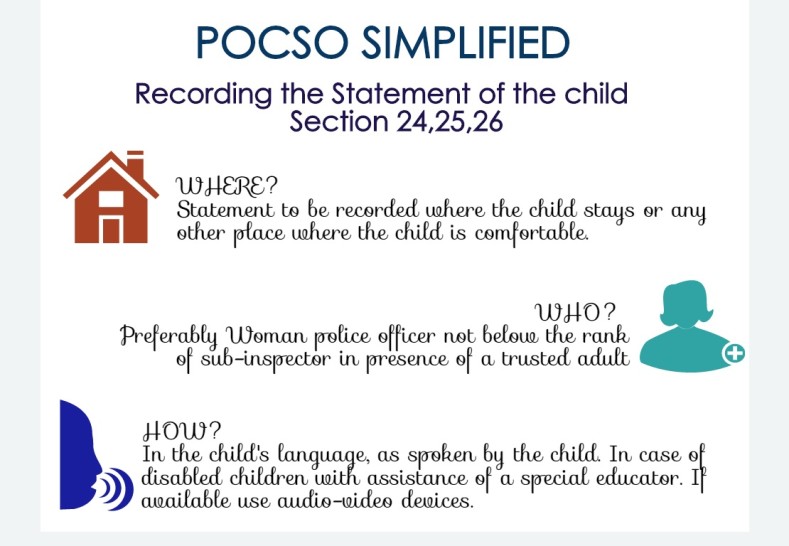THE ABCs OF CSA
An easy guide to learn the basics and clarify your myths around Child Sexual Abuse.
- Who is a child?
- Any person below the Age of 18 years as per
- The UN Convention on the Rights of the Child
- The Juvenile Justice Care and Protection Act, 2000
- The Protection of Children Against Sexual Offences Act, 2012
- What is child sexual abuse?
- Child sexual abuse happens when a person (younger or older than the child, male or female) involves the child (a boy or a girl) in sexual activities. The Protection of Children from Sexual Offences Act, 2012 defines three forms of sexual abuse and exploitation: Sexual Assault, Sexual Harassment and Pornography. For detailed definitions read What’s POCSO?
- What is Pedophilia?
- Pedophilia is a psychiatric disorder in which a person has a sustained sexual orientation towards children, generally aged 13 or younger – Ray Blanchard, PhD, adjunct psychiatry professor at the University of Toronto.
- What is Incest?
- Sexual activity between family members or close relatives is called Incest. POCSO defines cases of incest as aggravated offences.
- How many children in India are affected by child sexual abuse?
- Almost everyday newspapers carry reports cases of child sexual abuse. The cases we read are only the tip of the iceberg. Child Sexual Abuse is crime committed in a zone of silence. Most cases are never reported. An oft-cited study in the past has indicated that over 53% of children from across all socio-economic backgrounds in India are victims of sexual abuse. However there is no concrete data for the number of children groomed, sexually harassed and exploited. To know more, visit the Research section.
- Does child sexual abuse always mean “Touching”?
- Child Sexual Abuse includes both touch and non-touch forms of behavior. Some of the non-touch forms of sexual abuse include:-
- Verbal abuse & bullying
- Online sexual abuse
- Showing pornography to a child
- Watching and storing child pornography
- Indecent exposure like deliberately exposing an adult’s genitals to a child or making the child to do so
- Photographing a child with sexual intent
- Encouraging a child to watch or hear sexual acts
- Inappropriately watching a child undress or use the bathroom
- Are all offenders in CSA cases men?
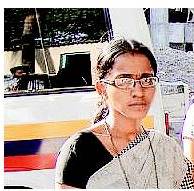
Shailaja Ghole is a resident of Kavdas, not very far from Mumbai, Maharashtra. She is currently in jail serving a term of seven years for aiding and abetting brutality, rape and murder of several children in an orphanage for mentally challenged children run by her husband.
In majority of the cases of child sexual abuse, it is men who have been accused & convicted of the crime. But all over the world there have been numerous cases where women have been perpetrators and abettors. When it comes to the safety and security of a child, we have to be gender neutral in our approach.
- Do both girls and boys get sexually abused?
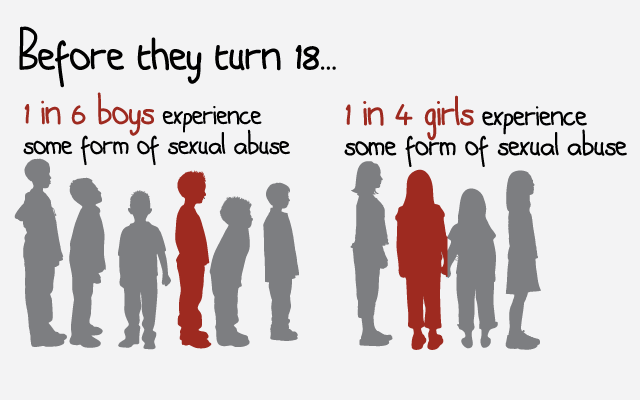
More than one study has shown that boys are as vulnerable to abuse as girls, if not more. All children need to be protected against abuse, irrespective of their gender.
- Why do children not talk about sexual abuse?
- It is important for us to understand sexual abuse from the CHILD’S PERSPECTIVE.
- Sometimes sexual abuse starts at an early age. There is no specific age for child sexual abuse to begin and end. Children are unable to articulate what they have gone through. ADULTS FAIL TO COMPREHEND when the child is reaching out to them.
- Talking about body parts and sexuality is not a norm in India. Most children and adults think that openly talking about sexual abuse is dirty. In such an environment children feel that they may be JUDGED and that the BLAME will be directed at them.
- Based on the position of the abuser in the family, in the society and in the life of child, children fear that they MAY NOT BE BELIEVED. If the abuser is family or family friend, the child may not want to CAUSE A FALLING OUT among the elders.
- If the child has been taught to always respect & listen to elders, they find it difficult to talk against the abuser & to say ‘NO’ to them.
- The abuser BRIBES the child to engage in sexual activity and maintain the ‘silence’.
- The child might have also felt some positive pleasure during the abuse this adds to the SHAME and GUILT of the child.
- Is there a typical profile of someone who sexually abuses children? (Source – stopitnow.org)
- NO. You cannot pick out a sex offender in a crowd. People who may sexually abuse children are fathers, mothers, stepparents, grandparents, uncles, aunts and cousins. They are neighbors, babysitters, religious leaders, teachers, and coaches. They come from all classes, racial and religious backgrounds and may be homosexual or heterosexual. Most of those we know about who sexually abuse children are men, but some are women. It’s important to remember that many terms used to describe people who sexually abuse children, like “pedophile” or “sexual predators,” are often misused according to their clinical or legal definition. And, media stereotypes of “child predators” and “monsters” may actually make it more difficult for us to recognize or acknowledge inappropriate behaviors in those people we know.Around the world it has been found that most of the perpetrators are known and trusted adults in the family, school and neighborhood.
- What should I do if I found out that a child is sexually abused?
- How can I detect the victim of sexual abuse? (Source – EnfoldIndia.org)
- The majority of the cases of Child Sexual Abuse may go unrecognized unless we are aware and look for signs that may be suggestive. How abused children can be detected through their behavior differs from case-to-case. The following is a chart prepared by Dr. Shekhar Sheshadiri, noted child psychiatrist that can help you identify a victim of sexual abuse
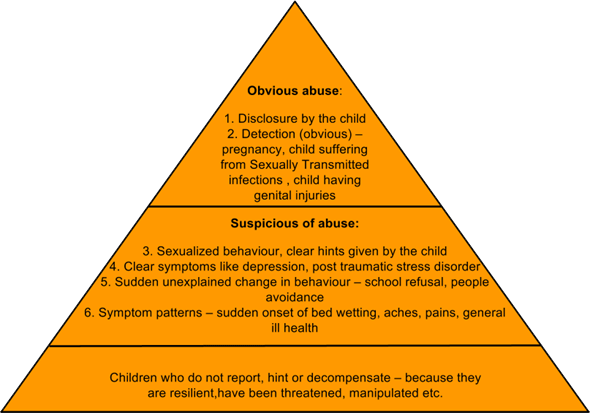
- What should I do if i find out that a child has been sexually abused? (Source – EnfoldIndia.org)
- Tell the child you believe her / him.
- Praise the child’s courage in coming and telling you about it.
- Acknowledge the child’s feelings.
- Don’t probe into what/when/where/how of the incident. Let the child share the incident at her/his comfort level.
- Tell the child it was not her/ his fault. The adult was at fault. The adult is guilty of a crime – even if the child could not tell when the abuse first started, the child was not responsible for the abuse continuing.
- Tell the child that you would like to take the help of other adults (family members, institutions, staff members) to help the child, with the child’s permission.
- Do not make false promises like “I will send the abuser to jail. I will beat him /her up etc’.
- Do not question or blame the child – “Why did you not shout for help?” “Why did you not tell me earlier?” “Why did you not fight?” Remember, it is a child and the abuser is a person known to the child – trusted and loved by the child. The abuser may have even threatened or blackmailed the child into silence.
- Do not ask the child to “forgive” “forget” or “adjust”.
If you feel you are unable to support the child, you can always take the help of a competent, empathetic and trained counselor. In any case, you can always believe, accept and continue to love and care for the child. Depending on an assessment of the child’s behaviour, symptoms and coping skills, mental health professionals need to be consulted. Severe symptoms, suspected or apparent self harm behaviour warrant a prompt consultation with a mental health professional with expertise in dealing with victims of child sexual abuse.


